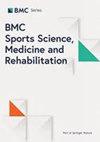Effect of swimming initiation period and continuation frequency on motor competence development in children aged up to 3 years: the Japan environment and children’s study
IF 2.1
3区 医学
Q1 REHABILITATION
引用次数: 0
Abstract
Although involvement of toddlers in swimming activities has increased recently, information regarding the impact of swimming during toddlerhood on subsequent child motor competence development is scarce. This study aimed to determine how swimming experience, particularly the timing of initiation and the continuity of swimming activities up to the age of 3 years, affects motor competence development. This prospective cohort study included data on children aged 1.5 and 3 years (100,286 mother–child pairs) from the Japan Environment and Children’s Study. The outcomes measured were gross and fine motor function, using the Japanese version of the Ages and Stages Questionnaire (Third edition). We assessed how these functions correlated with the continuous pattern of swimming pool use frequency from age 1 up to 3 years. The group that used a swimming pool once a month or more from age 1–1.5 years but stopped from age 2–3 years showed consistently significant negative associations with gross motor development delay (minimum adjusted odds ratio [aOR]: 0.66, 95% confidence interval [CI]: 0.60–0.73) and fine motor development delay (minimum aOR: 0.66, 95% CI: 0.58–0.76). The group that continued swimming once a month or more from age 1–3 years showed consistently significant negative associations with gross motor development delay (minimum aOR: 0.64, 95% CI: 0.54–0.75) and fine motor development delay (minimum aOR: 0.42, 95% CI: 0.31–0.55). These results suggest that swimming experience starting around age 1 year is positively associated with gross and fine motor function development. The beneficial impact on gross motor function persisted from age 1–3 years. In contrast, the effects on fine motor function were not evident until age ≥ 2.5 years after starting swimming at approximately age 1 year. These findings underscore the potential benefits of early swimming experiences in enhancing overall motor skills development during early childhood.游泳启蒙期和持续频率对 3 岁以下儿童运动能力发展的影响:日本环境与儿童研究
虽然近来幼儿参与游泳活动的人数有所增加,但有关幼儿期游泳对其后儿童运动能力发展的影响的资料却很少。本研究旨在确定游泳经历,尤其是开始游泳的时间和 3 岁前游泳活动的持续性,对运动能力发展有何影响。这项前瞻性队列研究纳入了日本环境与儿童研究中 1.5 岁至 3 岁儿童(100286 对母子)的数据。研究采用日文版年龄与阶段问卷(第三版)对粗大运动功能和精细运动功能进行了测量。我们评估了这些功能与 1 岁至 3 岁期间使用游泳池频率的连续模式之间的相关性。从 1-1.5 岁开始每月使用游泳池一次或一次以上,但从 2-3 岁开始停止使用游泳池的人群与粗大运动发育迟缓有持续显著的负相关(最小调整赔率 [aOR],0.66,95% 置信区间):0.66,95% 置信区间 [CI]:0.60-0.73)和精细动作发育迟缓(最小 aOR:0.66,95% 置信区间 [CI]:0.58-0.76)。从1-3岁开始每月坚持游泳一次或一次以上的人群与粗大运动发育迟缓(最小aOR:0.64,95% CI:0.54-0.75)和精细运动发育迟缓(最小aOR:0.42,95% CI:0.31-0.55)呈持续显著的负相关。这些结果表明,1 岁左右开始的游泳经历与粗大运动和精细运动功能的发展呈正相关。对粗大运动功能的有利影响在 1-3 岁期间持续存在。相比之下,对精细运动功能的影响要到 1 岁左右开始游泳后≥ 2.5 岁时才显现出来。这些发现强调了早期游泳经历对促进幼儿期整体运动技能发展的潜在益处。
本文章由计算机程序翻译,如有差异,请以英文原文为准。
求助全文
约1分钟内获得全文
求助全文
来源期刊

BMC Sports Science Medicine and Rehabilitation
Medicine-Orthopedics and Sports Medicine
CiteScore
3.00
自引率
5.30%
发文量
196
审稿时长
26 weeks
期刊介绍:
BMC Sports Science, Medicine and Rehabilitation is an open access, peer reviewed journal that considers articles on all aspects of sports medicine and the exercise sciences, including rehabilitation, traumatology, cardiology, physiology, and nutrition.
 求助内容:
求助内容: 应助结果提醒方式:
应助结果提醒方式:


